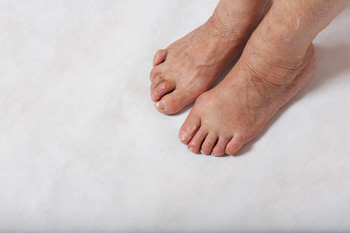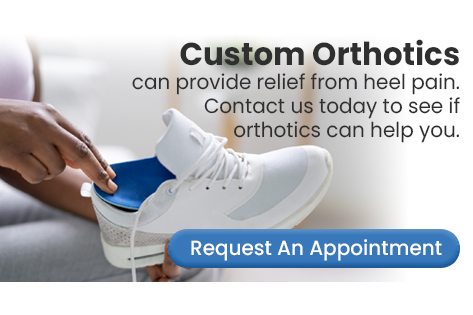
Hammertoes develop when the middle joint of a toe bends downward instead of lying flat, often causing discomfort and rubbing against footwear. They may start out flexible but can become rigid over time, making movement painful. Common causes include wearing shoes that crowd the toes, muscle imbalance, or trauma to the foot. High heels and narrow shoes can also increase the risk. Without proper care, corns, calluses, and joint stiffness may develop, making walking difficult. Treatment can range from wearing roomier shoes and using padding to relieve pressure, to custom orthotics that improve alignment. In more severe cases, surgery may be considered to restore function and comfort. If you notice your toe beginning to bend or experience pain while walking, it is suggested that you see a podiatrist for diagnosis and appropriate treatment.
Hammertoes can be a painful condition to live with. For more information, contact One of our podiatrists of Battle Creek Foot & Ankle. Our doctors will answer any of your foot- and ankle-related questions.
Hammertoe
Hammertoe is a foot deformity that occurs due to an imbalance in the muscles, tendons, or ligaments that normally hold the toe straight. It can be caused by the type of shoes you wear, your foot structure, trauma, and certain disease processes.
Symptoms
- Painful and/or difficult toe movement
- Swelling
- Joint stiffness
- Calluses/Corns
- Physical deformity
Risk Factors
- Age – The risk of hammertoe increases with age
- Sex – Women are more likely to have hammertoe compared to men
- Toe Length – You are more likely to develop hammertoe if your second toe is longer than your big toe
- Certain Diseases – Arthritis and diabetes may make you more likely to develop hammertoe
Treatment
If you have hammertoe, you should change into a more comfortable shoe that provides enough room for your toes. Exercises such as picking up marbles may strengthen and stretch your toe muscles. Nevertheless, it is important to seek assistance from a podiatrist in order to determine the severity of your hammertoe and see which treatment option will work best for you.
If you have any questions, please feel free to contact our office located in Battle Creek, MI . We offer the newest diagnostic and treatment technologies for all your foot care needs.

Struggling with heel pain? Discover the relief Custom Orthotics can bring. Customized to your foot's unique structure, Custom Orthotics offer targeted support, alleviating pressure points and redistributing weight. This means reduced heel pain and a more comfortable step, every time. Whether you're walking, working, or working out, Custom Orthotics ensure your heels feel cushioned and cared for. Experience the transformative power of Custom Orthotics with us today! Call today for more information.

Selecting the proper long-distance running shoes is essential for performance, comfort, and injury prevention. Look for shoes that offer ample cushioning to absorb impact and reduce strain on joints during repetitive motion. Proper support is also important, especially for those with flat feet or high arches, to maintain alignment and reduce fatigue. Road running shoes should provide a durable, lightweight design with breathable materials and a snug, stable fit. A podiatrist can assess your foot structure, gait, and training habits to recommend the best shoe type or prescribe custom orthotics. If you have endured a foot injury from wearing the wrong type of running shoes, it is suggested that you consult a podiatrist who can treat various foot injuries. This type of doctor can also guide you on how to purchase shoes for your desired running style.
You should always make sure your running shoes fit properly in order to avoid injury. For more information, contact One of our podiatrists from Battle Creek Foot & Ankle. Our doctors can provide the care you need to keep you pain-free and on your feet.
Choosing the Right Running Shoe for Your Foot Type
Improper shoe sizing can cause a myriad of problems for your feet. Shoes that don’t fit you properly can lead to muscular imbalances in your body, which can result in foot, knee, and hip injuries.
Tips for Finding the Right Running Shoe
- Make sure you have a thumb’s width of wiggle room between the end of your longest toe and the front of the shoe.
- There should be little to no slipping at the heel
- Don’t assume your size in one shoe brand will be your size in another
- Do not lace up your shoes too tightly
- Walk around in the store with your new shoes before you buy them
If you have any questions, please feel free to contact our office located in Battle Creek, MI . We offer the newest diagnostic and treatment technologies for all your foot care needs.

Some custom orthotics are made with materials that help lower pressure on certain parts of the foot while walking. Limited research suggests that materials such as polyurethane, polyethylene, and EVA may help reduce peak pressure in different areas. By reducing pressure in key spots, these materials can make walking more comfortable and may help prevent problems like calluses or ulcers, especially for those with sensitive feet. Although more research is needed, early findings show that the choice of material can make a difference in how well orthotics work. If you are looking for relief from foot discomfort or need help managing pressure-related issues, it is suggested you speak with a podiatrist to see if custom orthotics with the right materials might be helpful for you.
Custom orthotics can make a remarkable difference in daily comfort and mobility by supporting the feet in their most natural and balanced position. Because the feet form the foundation for the entire body, any imbalance can affect not only how a person walks, but also how the knees, hips, and spine align. Over time, this can lead to fatigue, pain, or reduced movement. Custom orthotics are designed to restore stability and promote proper alignment, which can transform the way a person feels and functions throughout the day.
People who wear custom orthotics often experience improved posture, less joint strain, and greater endurance during work, exercise, and leisure activities. The support they provide helps relieve chronic discomfort from conditions such as plantar fasciitis, flat feet, and heel pain, while also reducing the risk of future injuries. For those who stand for long hours or engage in sports, orthotics can make movement smoother and more efficient, allowing the body to perform at its best without unnecessary stress.
Each pair of custom orthotics is created after a detailed evaluation of foot structure, gait, and pressure distribution. By addressing each person’s unique needs, they offer comfort and confidence with every step.
If you are experiencing ongoing foot discomfort or fatigue, it is suggested that you contact our office for more information or to make an appointment.
If you have any questions, please feel free to contact our office located in Battle Creek, MI .
